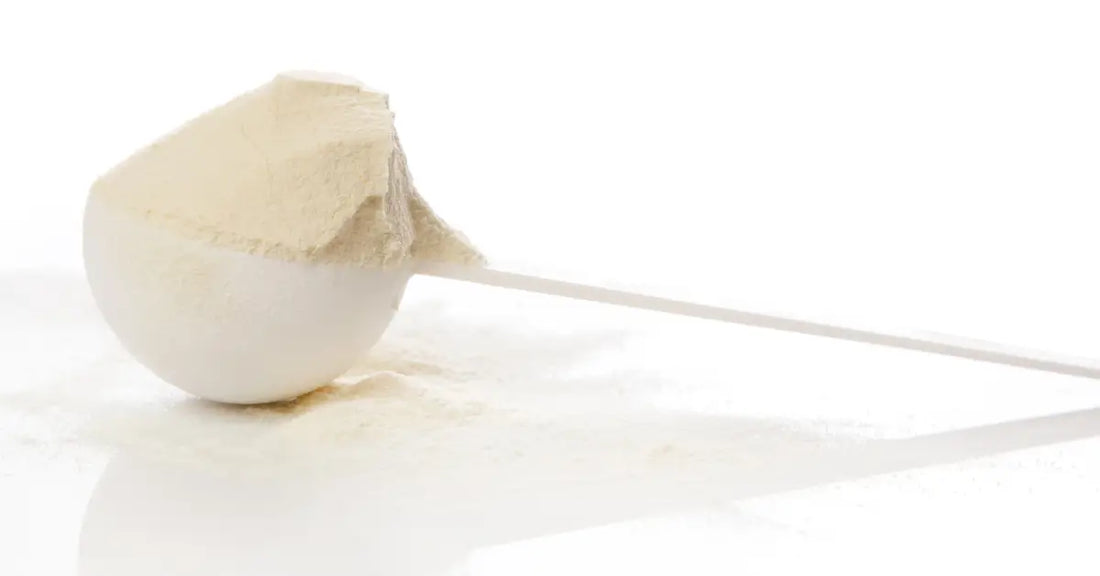Are you wondering if your protein consumption has gone overboard? While protein is essential for repairing and building muscle, especially for those with regular physical activity, relying too much on protein powder may not always support a healthy diet. This guide will help you determine the ideal amount of protein your body needs, based on your daily routine, weight, and overall health goals.
Understanding how much protein you need to consume is key to getting the benefits without overdoing it. Whether you're trying to build muscle or simply living a healthy lifestyle, your protein needs can vary.
Keep reading to discover how to align your protein intake with your lifestyle and recognize when it might be time to cut back. This approach helps you enjoy the benefits of protein while maintaining a balanced diet.
How Much Protein Do You Need Each Day?
According to the FDA, you generally need about 50 grams of protein each day if you're following a 2,000 calorie diet. This number helps you compare the protein in different foods. It's a basic guide for everyone.
However, the RDA, or Recommended Dietary Allowance, goes a bit deeper. It says you'd need 0.8 grams of protein for each kilogram you weigh. So, if you weigh about 165 pounds, that's around 75 kilograms, meaning you'd need about 60 grams of protein each day. This method considers how much you weigh, making it a bit more personal than the FDA's general advice.
Besides body weight, there are other important factors that can affect how much protein you need. Let's look at how age, gender, and activity level play a role.
-
Age Influences Protein Requirements
Age plays a role in determining your protein consumption. As you get older, your body needs more protein to maintain muscle mass and support overall well-being. Older adults, in particular, may benefit from a slightly higher intake to stay strong and live a healthy lifestyle.
-
Gender Plays a Role in Protein Intake
Gender can affect your protein needs. In most cases, men have more muscle mass than women, which means they might require more protein to maintain those muscles, especially if they engage in regular physical activity.
-
How Active Are You?
Your level of activity is one of the biggest factors in how much protein you should be getting. Those who exercise frequently or are training hard generally need more protein than those who are less active. For example, highly active individuals may need between 0.5 and 0.9 grams of protein per pound of body weight daily to support muscle recovery and growth.
How Much Protein Is Too Much?

It's important to know that most folks can handle up to 1.14 to 1.5 grams of protein per pound (2.5 to 3.3 grams per kg) of body weight daily, counting both food and supplements. But going over this might not be great for your health, like we talked about earlier.
Talk to a Doctor or Dietitian
If you're unsure about the right amount of protein powder for your needs, it's wise to consult a healthcare professional. A doctor or registered dietitian can assess your health status, goals, and daily habits to help you find the right balance of this essential macronutrient.
This is particularly important if you have any health issues or plan to increase your intake significantly. They can also guide you on the best protein sources to support overall wellness, including heart health, while avoiding unnecessary risks
What Can Happen If You Use Too Much Protein Powder
Using too much protein powder can have some downsides. While protein helps build muscles, repair tissues, and keeps you feeling good, too much can do more harm than help. Let's talk about what might happen if you overdo it:
1. Tummy Troubles
Taking in too much protein powder can sometimes lead to digestive issues. You might feel bloated, experience gas, or notice stomach cramps. This can occur when your body has trouble processing a large amount of protein at once, particularly if you're sensitive to some of the ingredients.
If these discomforts continue after using protein powder, it could be a sign that you're either overdoing it or reacting poorly to the specific type you're using.
2. Getting Dehydrated
Overusing protein powder may increase the risk of dehydration. When you consume more than the recommended amount, your body produces more nitrogen as a byproduct of protein metabolism, which requires extra water to flush out efficiently.
If you don’t stay hydrated, you may begin to feel thirsty, notice darker urine, experience fatigue, or even get headaches. To avoid these symptoms, make sure you drink enough water, especially when increasing your protein intake from powder or other sources.
3. Kidney Stress
Consuming large amounts of protein can strain the body's filtration system, especially if you have existing health conditions affecting renal function. One of the main roles of this system is to remove waste products from the blood, including the byproducts of excess protein.
When protein intake is too high, it forces these organs to work harder than usual. If you have impaired kidney function or a diagnosed condition, it’s important to consult a healthcare professional before increasing your intake through powders or supplements.
Why It's Good to Get Protein from Real Food

While protein powder can be a convenient way to support your daily intake, it should not replace nutrient-rich whole foods. Natural protein sources like chicken breast, salmon, red meat, Greek yogurt, legumes, seeds, and grains provide additional benefits, such as fiber and minerals that powders often lack.
Even those with higher protein needs, such as athletes, can meet their goals through a balanced eating plan focused on whole foods. Including a variety of these foods ensures you get all the essential amino acids your body needs for muscle recovery and overall wellness.
Relying too much on shakes may lead to excessive calorie intake and reduce your intake of key nutrients found in everyday meals. This can increase the risk of weight gain and nutritional gaps.
When using protein powder, consider it a complement to your meals. Aim to get most of your protein from whole foods and use powder only when you need something quick or to help meet your target.
How to Pick a Good Protein Powder
When you're choosing a protein powder, make sure you pick a high-quality one from a trustworthy company. Here's what to keep in mind:
Check the Label and Ingredients
It's important to read the label and review the ingredients carefully when it comes to protein powder. Choose products with minimal additives, no unnecessary fillers or artificial ingredients, and low levels of added sugar. Aim for powders that have clear, simple ingredient lists so you know exactly what you're putting into your body.
Why Consider Plant-Based Protein Powders
Although whey protein is a common pick, plant-based protein powders are worth considering, especially if you have special diet needs or preferences. Powders made from peas, soy, or rice can be easier on your stomach and are a better choice for the planet. They're good for vegans or anyone who doesn't do well with dairy.
One cool thing about plant-based proteins is they can give you all the amino acids you need when you mix different types. So, even if one type of plant protein doesn't have all the essential amino acids, combining them can cover all your bases for muscle building and repair.
Finding Your Protein Powder Balance

As we wrap up, remember that moderation is key. Protein in your diet plays a crucial role in staying healthy, especially if you're active, but knowing how much you need is essential. Adjust your intake based on your activity, weight, and health goals. If you're unsure, it's always good to talk to a health professional.
For a natural protein option, try EarthChimp. It's 100% organic and vegan, blending pea, pumpkin, sunflower, and coconut proteins. EarthChimp Vegan Protein Powder is gentle on your stomach with no artificial flavorings, GMOs, added sugars, or dairy. Plus, it includes probiotics to support your gut health.
Choosing the right protein powder helps you get quality nutrition without overdoing it. This keeps your health journey on track and your body feeling great.
FAQ: Understanding Protein Powder Intake
How much protein should a person consume per day?
Adults generally need about 0.36 grams of protein per pound (0.8 grams per kg) of body weight per day. This can go up to 0.6–0.9 grams per pound for those looking to build muscle. It's important to adjust your intake based on your activity level and health goals.
What are some good sources of protein besides protein powder?
There are many sources of protein you can include in your diet, such as beans, nuts, seeds, fish, and lean meats. High protein foods like these can help you get enough protein without relying solely on supplements.
Is consuming too much protein bad for you?
Yes, consuming too much protein can cause health issues. It can lead to digestive problems like bloating and gas, and in severe cases, it may stress your kidneys, especially if you have existing kidney conditions.
How much protein is in one scoop of protein powder?
One scoop of protein powder typically contains 20-30 grams of protein, depending on the brand. Always check the label to know exactly how much protein you're getting per scoop.
What types of protein powder are available?
There are many types of protein powder, including whey, casein, pea, soy, and rice. Whey protein powder is popular, but plant-based options like pea and soy are great for those avoiding dairy.
How can I monitor my protein intake?
To monitor your protein intake, keep track of the protein content in the foods you eat and the supplements you use. Aim to meet but not exceed your daily protein needs based on your body weight and activity level.
Is it safe to have two protein shakes per day?
Having two protein shakes per day can be safe, but it's important to balance them with whole foods. Ensure you're not exceeding your protein needs and consult a healthcare professional if you're unsure.
References:
- https://www.ncbi.nlm.nih.gov/pmc/articles/PMC4045293/
- https://www.health.harvard.edu/nutrition/when-it-comes-to-protein-how-much-is-too-much
- https://www.healthline.com/nutrition/is-powder-bad-for-you
- https://www.eatingwell.com/article/8054894/is-too-much-protein-powder-bad-for-you/
- https://www.livestrong.com/article/543936-what-happens-if-you-drink-too-much-whey-protein/
- https://www.healthline.com/health/too-much-protein
- https://www.ncbi.nlm.nih.gov/pmc/articles/PMC6054213/
- https://www.health.harvard.edu/blog/how-much-protein-do-you-need-every-day-201506188096
- https://www.accessdata.fda.gov/scripts/InteractiveNutritionFactsLabel/assets/InteractiveNFL_Protein_October2021.pdf
- https://www.ncbi.nlm.nih.gov/pmc/articles/PMC9963165/
Disclaimer:
This statement has not been evaluated by the Food and Drug Administration. This product is not intended to diagnose, treat, cure, or prevent any disease.















